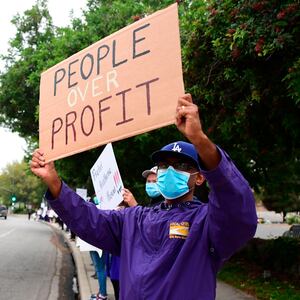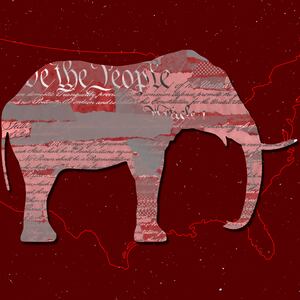In a recent New York Times/Siena College poll, Americans expressed concerns about the stability of democracy, but still ranked their economic security as a higher priority. But it shouldn’t be an either/or proposition.
As the clock ticks down to the midterm elections, Democrats need to make it clear to voters that the crisis facing our democracy is inextricably linked to the economic issues they’re concerned about. Voters need to be reminded that President Joe Biden and the Democrats are committed to creating economic prosperity following a once-in-a-generation pandemic, and also that Republicans are actively attacking voting rights, election processes, and the rule of law.
A 2021 study by economists Daron Acemoglu, Nicolas Ajzenman, Cevat Giray Aksoy, Martin Fiszbein, and Carlos A. Molina shows that across the world, when a nation adopts democratic rule, gross domestic product (GDP) per capita increases. In this study, these economists found that countries experienced a 20 percent increase over a 25-year period, as opposed to a decrease in GDP if they had remained authoritarian.
What does this have to do with the United States?
In the last several years, Republicans have increasingly tilted towards authoritarianism. During the 2020 election, Sen. Mike Lee of Utah said “democracy isn’t the objective.” Former President Donald Trump has maintained his steady drumbeat of attacks on American elections—calling the 2020 election “rigged” and “stolen,” despite no evidence of widespread election fraud. In 2021 alone, Republicans introduced more than 400 anti-voter measures in states across the country. Arizona Republican gubernatorial candidate Kari Lake, along with hundreds of other Republican candidates on ballots across the country, continues to express mistrust of the 2020 election results—and would not commit to accepting the results of the 2022 election if she loses.
A lot of voters—including some Republicans—are bothered by these authoritarian messages, but not more so than they are about the lagging economy. During the Jan. 6 Committee hearings this summer, Democrats focused on discussing the fragile state of democracy following the insurrection at the Capitol. Although the information showcased during the hearings was impactful, viewership was lower than expected.
Americans’ attention has instead been focused on “kitchen table issues.” Due to global inflation following the coronavirus pandemic, household items have gotten more expensive. Gas prices are fluctuating wildly—both up and down—while the costs of everyday groceries such as chicken, milk, and flour are through the roof.
As a result, financial goals like saving up for a vacation, putting money in a college fund, or building a retirement account have become much more difficult. The tightening grip of international inflation can be overwhelming and is felt in every part of the economy.
It is difficult to quantify what impact democracy has on your daily well-being, so it's understandable democracy would fall lower on a voters’ priority list than paying bills and buying groceries. That’s why Democrats need to show voters how the attacks Republicans are waging on our democracy can hurt their economic stability.
A study conducted by the Perryman Group, a Texas-based economic consulting firm, found that the state’s economy will lose over $30 billion by 2025 due to SB 1, the dangerous voter suppression law, put in place last year.
Their analysis is clear: restricting voting access can hurt the economy because it makes it harder for people to vote, which costs them time and money. In addition, workers who are usually impacted by voter suppression (and tend to work low-paying jobs with the least flexibility for time off) will still try and vote. This means they’ll have to take unpaid time off to vote, and will have less money to spend in the economy. The study predicts this ripple effect could result in $1.5 trillion in economic losses for the state of Texas over the next 25 years.
An unstable democracy would not only result in a decrease in spending but may also ship American jobs overseas.
In May 2022, 175 business leaders sent a letter to the Speaker of the Texas House about SB 1, stating the law would “inevitably damage our competitiveness in attracting businesses and workers to Houston. Especially as we aim to attract major conferences and sporting events, including the FIFA World Cup, voter suppression is a stain on our reputation that could cost our region millions of dollars.”
Democrats need to hit the GOP on this issue: Republicans’ flirtation with authoritarianism could take jobs away from hard-working Americans and ship them overseas. By tying further economic hardship to the GOP’s attacks on American democracy, Democrats can deliver a simple message that puts them on the right side of both battles.
Unlike former President Trump and the Republicans, the Democrats have been economic leaders during President Biden’s tenure. Whether it’s the Inflation Reduction Act, which cut prescription drug costs and made sure no family making less than $400,000 had to pay higher taxes, or the Bipartisan Infrastructure Deal, which will create more than 700,000 new jobs every year—Democrats have taken substantial action to put the U.S. on the long road to recovery following the COVID-19 pandemic.
So, while the stability of American democracy isn’t the number one issue on voter minds this November, Democrats must still make certain voters understand why it’s important.
In tying economic success to the strength of democracy, Democrats can inspire voters to give them the majorities they need in both chambers to address the problems facing our economy—and pass legislation to protect our democracy.









